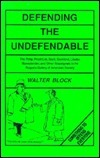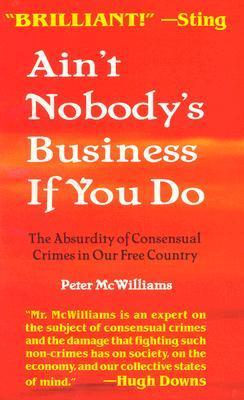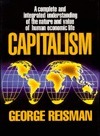
Defending the Undefendable
Book Description
What if the most despised figures in society were actually champions of freedom? In "Defending the Undefendable," Walter Block boldly challenges deep-seated taboos and strips away moral judgments in a riveting exploration of controversial professions. From drug dealers to sex workers, each chapter unearths the hidden truths that underpin their existence, revealing the economic principles that defend their roles in an imperfect world. With each page, a provocative debate unfolds, forcing readers to confront their beliefs about ethics and legality. Can society afford to overlook the fundamental human rights of those deemed unworthy?
Quick Book Summary
"Defending the Undefendable" by Walter Block is a provocative collection of essays that challenges widespread societal condemnation of maligned professions and individuals. Block, writing from a libertarian perspective, systematically examines various "undesirable" roles—such as black market entrepreneurs, prostitutes, and speculators—arguing that, far from harming society, they often promote liberty, voluntary cooperation, and economic efficiency. By dissecting the moral and economic instincts that drive public disdain, Block exposes the underlying benefits these roles provide within a free society. His controversial yet rigorous arguments force readers to confront their biases and consider whether the legal and moral persecution of these groups is justified or, in fact, antithetical to individual freedom. The book ultimately argues for a principled defense of human rights and voluntary exchange, regardless of prevailing taboos.
Summary of Key Ideas
Table of Contents
Challenging Social Taboos Through Economic Analysis
Walter Block opens his book with a challenge to conventional morality, targeting society’s gut reactions and moral disgust toward certain professions. He argues that rather than relying on emotion or majority prejudice, we should use economic reasoning to evaluate roles such as drug dealers, ticket scalpers, and prostitutes. By stripping away the emotional veneer, Block invites readers to recognize that distaste does not necessarily equate to harm. He insists that many "undefendable" individuals are merely responding to market demands and voluntary exchanges.
The Morality of Voluntary Exchange
Central to Block’s arguments is the concept of voluntary exchange. He maintains that as long as transactions are consensual and nonviolent, external condemnation lacks justification. Professions such as black market traders and loan sharks, often reviled for undermining regulations, actually provide valuable services—liquidity, risk management, and meeting unmet consumer needs—within the confines of willing participation. These professions demonstrate the importance of freedom in choice, highlighting a core libertarian belief: that individual liberty matters more than collective moralization.
The Role of Marginalized Professions in a Free Society
Block dissects the economic functions performed by ostracized roles, arguing many fill gaps left by regulation or bureaucratic inefficiency. For example, ticket scalpers ensure tickets go to those valuing them most highly, and speculators stabilize markets by absorbing risk. By highlighting these underlying economic benefits, Block demonstrates that society often ignores or misunderstands the positive externalities provided by controversial figures. Their existence is not inherently exploitative but arises from genuine market demand.
Public Perception Versus Economic Reality
A key theme is the divergence between public perception and economic reality. Block illustrates how moral panic and emotional narratives often distort the actual effects of certain transactions. Laws and societal norms that criminalize or stigmatize these roles are shown to be more about signaling virtue or protecting entrenched interests than safeguarding public welfare. This misalignment, Block suggests, damages society by creating black markets, pushing activities underground, and occasionally worsening the problems purportedly being solved.
The Case for Individual Liberty and Consistency
In the final analysis, Block calls for intellectual consistency and a principled defense of liberty. He urges readers to recognize the rights of those at society’s margins, as the protection of the unpopular is a test of any free society’s values. By upholding individual rights regardless of prevailing distaste, Block contends that society not only preserves freedom but also benefits economically and ethically. The book offers a radical reevaluation of ethics in law and economics, challenging readers to defend liberty even for the least sympathetic among us.
Download This Summary
Get a free PDF of this summary instantly — no email required.





